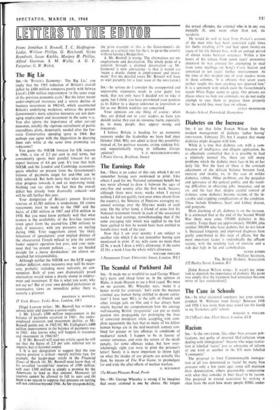C - 7 LAR L -3 C) 71i -- micron
From: Jonathan S. Boswell, T. C. Skellington- Lodge, William Phillips, G. Reichardt, Gyles Brandreth, Susan Knibbs, Marjory H. Phillips, Alfred Sherman, S. M. Wyllie, A. G. F. Farquhar, G. W. Welch.
The Big Lie
StR,—In 'Britain's Economy: The Big Lie,' you imply that the 1965 reduction of Britain's overall deficit by £400 million compares poorly with Selwyn Lloyd's £500 milliOn improvement 'at the same stage of the previous economic cycle.' But the latter meant under-employed resources and a severe decline in business investment in 1962-63, which accentuated Britain's underlying weakness; whereas the present Government's more selective measures are not dam- aging employment and investment in the same way. You also ignore the importance of other current measures, notably the vigorous curtailment of public expenditure plans, desperately needed after the fan- tastic Conservative spending spree in 1964. But perhaps you agree with the Opposition in decrying these cuts while at the same time promising tax reductions? You quote the NIESR forecast for UK imports in 1966, a rise of 2.5 per cent in real terms, but conveniently ignore their parallel forecast for an export increase of 4.6 per cent. It's true that both NIESR and the London and Cambridge economists query whether on present form the Government's balance of payments target for end-1966 can be fully achieved. But both insist that what matters is clear progress towards it and an improving trend. Nothing you say alters the fact that the overall deficit has already been drastically reduced—and will be still further this year. Your denigration of Britain's present first-line reserves of £1,303 million is tendentious. Of course repayments must be made to the IMF and the Swiss, of £385 million in 1967 and £514 million in. 1970. But you must know perfectly well that what matters is the availability of the first-line reserves (even apart from the second-line £500 million) to deal, if necessary, with any pressures on sterling during 1966. Your suggestions about 'the likely behaviour of speculators,' your implied defence of' the obscurantist French refusal to join the central banks' support operation last year, and your state- ment that `on present policies . . . we are headed straight for a „messy devaluation,' are almost un- equalled for irresponsibility. Although neither the-NIESR nor the LCB suggest further deflation, extra measures may well be neces- sary, probably including more restraints on con- sumption. Both of your own dramatically posed alternatives would mean a drastic slump in employ- ment and investment. If this is what you want, why not say so? But of your own detailed preferences or constructive views on immediate policy there is, scarcely a glimmer.
JONATHAN S. BOSWELL, /7 York House. Turks Row, London. SW3
[Nigel Lawson writes: Mr. Boswell has written a serious letter and deserves a serious reply. 1. Mr. Lloyd's £500 million improvement in the balance of payments occurred in 1961: the under- employed resources and investment decline, as Mr. Boswell points out, in 1962/63. Mr. Callaghan's £400- million improvement in the balance of payments was in 1965: who knows what will happen to resources and investment in 1966/67? 2. If Mr. Boswell will read my article again he will see that the figure of 2.5 per cent referred not to imports, but to national output 3. It is not denigration to suggest that the true reserve position is critical—merely realistic (see, for example, the leader-page srticle in the Financial Times of March 16). Mr. Boswell must know that. of his so-called 'second-line' reserves of £500 million, well over £300 million is simply a promise by the Americans to •lend us that amount. Moreover (a) reserves cannot be allowed to fall to zero and (b) there is no reason to suppose that pressure on sterling will not continue beyond 1966. As for irresponsibility, the prize example of this is the Government's de- cision, at a critical time for the f, to go to the country without having a Budget first. 4. Mr. Boswell is wrong. The alternatives are un- employment and devaluation. The whole point of a solution through a planned devaluation—as Mr. Grimond is now advocating--is that it would not 'mean a drastic slump in employment and invest- ment.' For my detailed views Mr. Boswell will have to wait patiently for a later issue of the SPECTATOR.] SIR,—So serious do I consider the unsupported and unprovable statements made in your paper last week, that not only have I decided not to take it again, but I think you have prostituted your position as its Editor to a degree unknown in journalism as far as our British weeklies are concerned. Your opinions are one thing, of course: when they are dished out to your readers as facts you should realise they can do immense harm, especially as, to many people, they appear wrong and inaccurate. I believe Britain is heading for an economic recovery under the leadership we have had since October 1964. Why not admit at least this possibility instead of, for partisan reasons, crying stinking fish. and unpatriotically trying to influence foreign


































 Previous page
Previous page